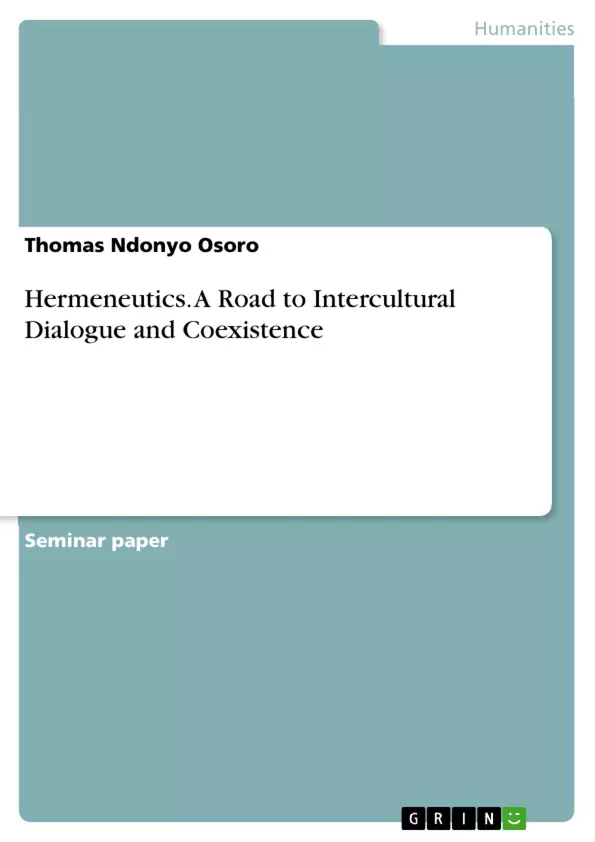Our contemporary society is marked with both positive and negative elements. On one hand, all world cultures want to develop into a contemporary world civilization heralded by the current and sophisticated information and communication technologies that have permeated through different social-cultural and political-religious realms. In this socialization process, there is the question as to if there is a proper dialogue among different cultures and cultural mindsets before accepting some cultural contents from another.
In this article, I discuss three main points which have got to do with requisites for an intercultural socialization process based on the understanding of one’s own culture, the language use, and the understanding of a culture’s symbolism. It is then after a well established interpretive processes leading to self-awareness as persons in a culture that people of a given culture can open up to the others for a for and coexistence. This is a challenging issue as some culture which consider themselves as superior to others may manipulate the process or simply requires that other cultures assimilate their style of life. Nevertheless, hermeneutics as a science of interpretation serves a useful tool in dealing with inter-cultural exchange processes within the realm of the symbolic language use and the power of symbolism it shrouds.
The Word hermeneutics comes from a Greek Word hermeneuein, which means to interpret (Hernandez, 2008), a task proper to human beings in order to meaningfully understand the world they inhabit. Gonzalez (1996: 146) holds the same thought when he asserts, “on the basis of experience, and on the prevention of a possible future, I make an option, take an attitude, decision or stand, which automatically go adjusting themselves according to the new experiences that I encounter in communication in which we organize our possibilities and impossibilities” (author’s translation). Hence, to interpret implies learning to live, through the raising of “Socratic questions” in pursuit of the sense of the reality that circumscribe our constant search for understanding.
According to Arráez, Calles, & Tovar (2006), the word Hermeneutics is not new in the human history as it has been used since the time of Aristotle (384-382 B.C) who used it in his work Organum in which he wrote Peri hermenais as an instrument for the correct and certain thought.
Inhaltsverzeichnis (Table of Contents)
- Abstract
- Key Words
- Introduction
- Understanding Hermeneutics
- Hermeneutics of Inter-cultural Exchange
Zielsetzung und Themenschwerpunkte (Objectives and Key Themes)
This paper examines the role of hermeneutics in interpreting cultural content across different societies, emphasizing its potential for promoting intercultural understanding and coexistence. It aims to demonstrate how hermeneutics can contribute to a more harmonious and equitable global society.
- The importance of hermeneutics in understanding and interpreting cultural content
- The role of language and symbolism in intercultural dialogue
- The challenges of intercultural exchange in a diverse and interconnected world
- The need for a balanced approach to intercultural dialogue that respects individual and collective values
- The potential of hermeneutics to facilitate a more just and equitable global society
Zusammenfassung der Kapitel (Chapter Summaries)
- Abstract: This paper explores hermeneutics and its application in interpreting written cultural content as a crucial step toward fostering intercultural understanding and exchanging values in a globalized society. It focuses on three key themes: hermeneutics of intercultural dialogue, hermeneutics of language, and hermeneutics of symbolism.
- Introduction: The paper highlights the challenges and opportunities of intercultural dialogue in a contemporary world marked by both interconnectedness and cultural diversity. It introduces the three main points that will be explored: understanding one's own culture, language use, and cultural symbolism.
- Understanding Hermeneutics: The chapter delves into the history and evolution of hermeneutics as a science of interpretation. It discusses the contributions of key figures such as Aristotle, Schleiermacher, Gadamer, and Dilthey, highlighting different approaches to understanding text and context.
- Hermeneutics of Inter-cultural Exchange: This chapter focuses on the application of hermeneutics to intercultural dialogue. It examines the challenges of navigating cultural differences and the importance of respecting individual and collective values. It also explores the impact of globalization and its influence on cultural identities.
Schlüsselwörter (Keywords)
The main keywords and focus topics of this text are: hermeneutics, intercultural dialogue, cultural exchange, understanding, interpretation, language, symbolism, philosophy, globalization, diversity, inclusion, coexistence.
Frequently Asked Questions
What is the origin of the word "Hermeneutics"?
The word comes from the Greek "hermeneuein", which means to interpret. It has been used since Aristotle's time as a tool for correct and certain thought.
How does hermeneutics help in intercultural dialogue?
Hermeneutics provides a framework for interpreting the symbolism and language of different cultures, fostering mutual understanding and preventing forced assimilation or manipulation.
What are the main requisites for intercultural socialization?
Effective socialization requires understanding one's own culture, careful use of language, and a deep grasp of cultural symbolism before engaging with others.
Who are key figures in the history of hermeneutics?
Major contributors include Aristotle, Schleiermacher, Dilthey, and Gadamer, each offering different approaches to interpreting texts and human experience.
Why is self-awareness important in this process?
Self-awareness allows individuals to recognize their own cultural biases, which is a necessary step before opening up to a fair and equitable coexistence with other cultures.
- Citar trabajo
- Thomas Ndonyo Osoro (Autor), 2015, Hermeneutics. A Road to Intercultural Dialogue and Coexistence, Múnich, GRIN Verlag, https://www.grin.com/document/300157



